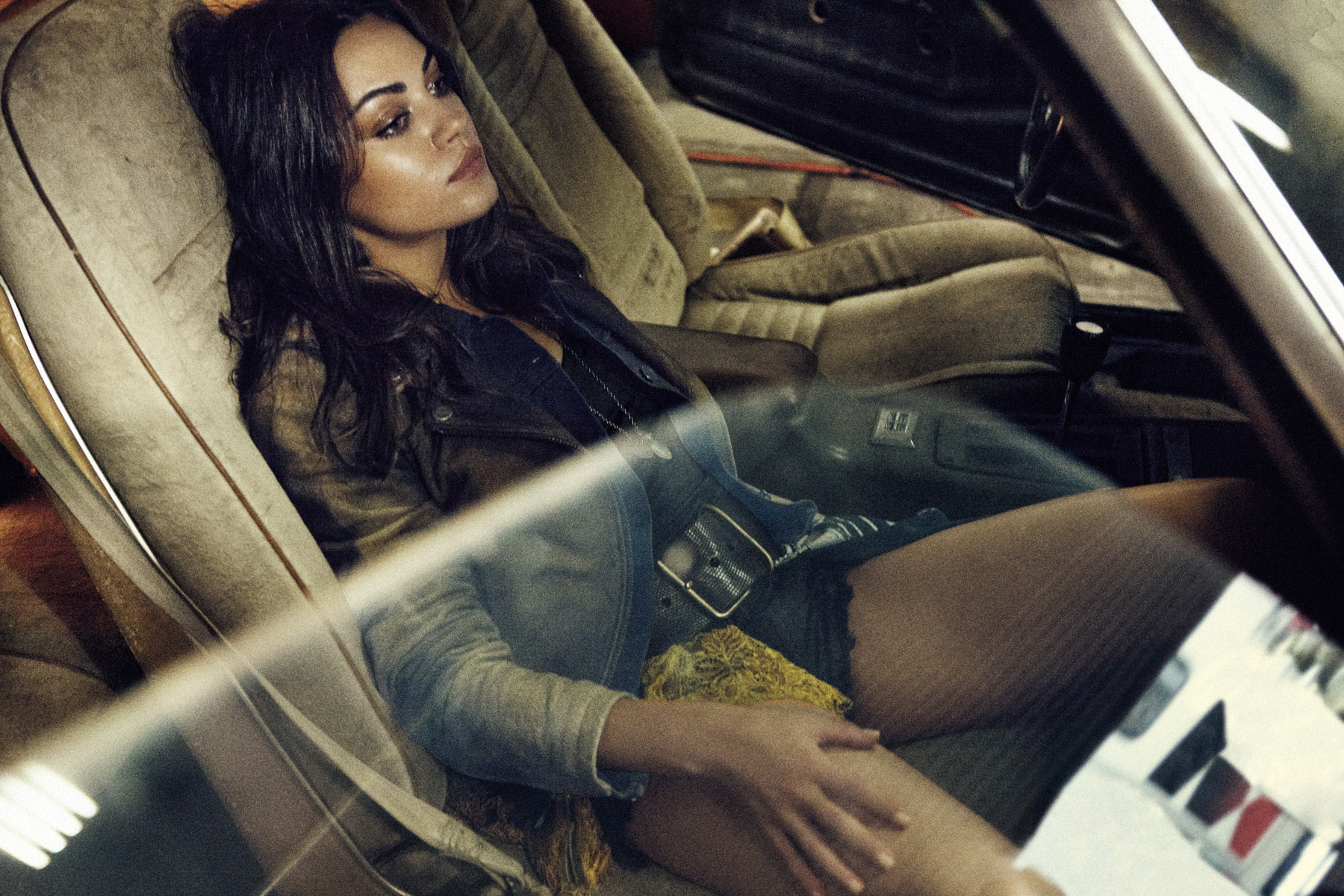
Unassumingly, I have a crush on James Franco, I saw Howl a few years ago, and becasue of my admiration for Allen Ginsberg and obvious crush on James Franco, I fell in love. Mila Kunis, I have always always always loved since That 70s Show and more recently Black Swan. So when the two sat down to interview EACHOTHER, I had to jump on it immediatly and share it with you guys.
The following is an excerpt from Interview’s magazine interview with the two:
JAMES FRANCO: So a funny thing happened on this movie I’m doing down here in New Orleans that made me think of you. The movie is a comedy, but it’s kind of an outrageous one, and this actress—I won’t say who, but she had a smaller role in the film—walked off the movie in the middle of a scene.
MILA KUNIS: This is Seth [Rogen]’s movie that you’re talking about?
FRANCO: Yeah. I’ll admit that the scene we were doing was pretty crazy. There’s not any nudity, but it is pretty outrageous. It’s not as if the scene wasn’t in the script, though. In any case, I didn’t see any of this go down, but I guess she basically went up to the directors, Seth and Evan [Goldberg], and said, “I don’t think I can do this.” She, by the way, didn’t have to do anything crazy in the scene. But what was going on around her was, I guess, too extreme for her. So Seth was like, “Well, what can we do to fix it?” And she said, “There’s nothing you can do to fix it. It’s just everything.” And he said, “Well, let’s just shoot it and I promise you can come to the editing room, and, if you don’t like what we’ve cut together, then we will not put it in the movie.” And she said, “No, that’s still not good. I just can’t do this. I can’t be here.” And he said, “Do you want to leave?” And she said, “Yeah, I’ve got to leave.”
KUNIS: What?
FRANCO: Yeah, so she left. But what I’m really leading to is that my experience working with you has, in many ways, been the opposite of that.
KUNIS: I guess you could say that I have no shame. [laughs] I mean, if you think about all the stuff that you’ve made me do—just you alone, James . . .
FRANCO: We can get into that if you want.
KUNIS: We don’t have to get into details, but that poor girl would never be able to do a short with you. She would never be able to have fake blood thrown at her, with blood-sucking vampires and dildos being thrown everywhere.
FRANCO: At this point, we might need to explain that you and I worked together many times before. I’m sure that some people know that we did a Funny or Die video together, and then we did Date Night, and then we just acted together inOz: The Great and Powerful, which was directed by Sam Raimi. But we’ve also done a bunch of side projects together. There is one that we did in a trailer with my hair-and-makeup person, Nana Fischer, that I don’t know if anybody will ever see. [both laugh] We did a feature called Tar—that one people will definitely see. And then there’s the one you’re referring to where you play a leather-clad, bow-and-arrow-wielding vampire killer, and let’s just say that there is lots of blood and gore.
KUNIS: Yes. That would not be okay for that girl. I, on the other hand, am game.
FRANCO: What I’d like to do is figure out why that is. First of all, do you think that it’s different for actresses than for actors—that women have to be more guarded about what they do and what they don’t do than men?
KUNIS: I do. I think that an actor is more likely to be forgiven in the public’s eye than an actress.
FRANCO: Why?
KUNIS: I don’t know. I think there will always be a double standard between males and females, so I think that an actress is more likely to protect her public persona, so to speak, than an actor would be. An actor goes crazy in a hotel room, gets trashed, throws a bench, breaks a window, and he is considered a rock star. An actress does that and she’s sent to rehab and is thought to have problems and issues and can’t get a job.
FRANCO: But what you’re talking about is off-screen behavior. What about on-screen behavior? Do you think that men and women are treated differently in terms of what they do on screen?
KUNIS: I think that it goes both ways. I think that when a person is insecure about who they are or who they want to be, then it translates on screen, and the choices they make are all about perception. If I’m not comfortable in my own skin or confident in who I am, then I’m going to pick parts based on how people are going to view them, not based on what I find challenging or entertaining. And I think that there are a lot of reasons to be insecure as an actress . . . But I don’t really have a perception issue. I’ve been pretty good about being who I am in the public’s eye. I don’t necessarily put on an act when I go on Jay Leno or dress differently in public than I do in private. I’d like to think I’m the same person, more or less. So when it comes to picking parts, I do make an effort to choose parts that I want to do, and not necessarily parts someone else wants me to do, or parts that someone else is going to respond to. I’ve said this before, but after That ’70s Showended, I solely wanted do films that inspire me, and to work with people who make me better. I wanted to just surround myself with people who I think are better than I am, whether they’re actors or directors or producers, so that I could learn from them. And I think that’s pretty much what I’ve done. I think that if I hadn’t done it that way, then I would’ve just stunted myself.
FRANCO: Did you have to learn that? Or did it somehow click that you could do movies or take roles based on what you believed in rather than choosing roles that might be, quote-unquote, career choices?
KUNIS: Well, honestly, after doing a TV show for eight years and a cartoon for more than a decade, you are, financially speaking, in a very lucky position where you don’t have to work for the sake of working. And I decided to take advantage of that. I don’t live lavishly, so it’s not like I have 20 assistants and travel privately and shop every day. I actually live a very mediocre lifestyle. [laughs] So I decided to step back and do things not just for the sake of doing them, but because I believe in them and I want to do them.
FRANCO: So why do you feel secure doing things that other actresses might not feel secure doing?
KUNIS: Because I really have no shame, James. Let’s just call a spade a spade. I think that certain things are funny and certain things are okay to make fun of—including myself. I think that you have to laugh at the absurdity of this entire industry and the absurdity of what it is we do. If I didn’t, I’d go crazy.
FRANCO: How would you go crazy?
KUNIS: If all my eggs were in this basket and I had nothing else and I was just so enamored with it all . . . This industry can eat you alive. I think it feeds you a lot of bullshit and then spits you right back out, and then you get caught up in it because so much of it is perception and opinion. The fact that there is no right or wrong is what I think is maddening. I can think you’re a phenomenal actor, but the guy next door can think you’re a horrible actor, and neither of us is wrong and neither of us is right. It’s just a matter of opinion. And when your only source of happiness comes from that opinion, you go mad. So I think that you have to restrain yourself from googling your name and have other hobbies and desires and wants. I mean, you do a million things. You go to school, you write, you read, you blog.
FRANCO: Well, that was one of the main reasons that I did go back to school—that I needed something else. But for a while, this was all that I had, and it formed my sense of self-worth. As much as I could tell myself that it doesn’t matter what people said or if a movie bombed, for a while that was kind of my only way of gauging my self-worth.
KUNIS: Which is a horrible way to go through life. Of course, it’s easier said than done – it’s easier said than done at this very moment for me. But I feel like I consciously make an effort to remind myself of that-or at least I’m trying and making it a priority. So to answer the question as to why I do silly things: Because . . . Why not?
FRANCO: So with that kind of attitude must come a mechanism for dealing with criticism, because if you do put yourself out there and do things that are not safe, then you run the risk of being criticized for it. How do you deal with criticism?
KUNIS: [sighs] As cheesy as it sounds, you deal with it the best that you can. To be honest, I don’t deal with it well. I can’t tell you that I’m like, “Oh, I’m so great at dealing with it. It’s in one ear and out the other!” That would be complete and utter bullshit. But I take it for what it’s worth. Sometimes I let it get to me—I have internal dialogues with myself all day long. But, you know, people criticize a woman for everything—like, I get criticized for how my hair looks when I go grocery shopping or the fact that I don’t wear makeup when I get my nails done. Women get scrutinized all the time for the way they look. So if I can learn to deal with that, then I do believe I can learn to deal with people’s criticisms of my film choices.
FRANCO: You started acting at a really young age, right?
KUNIS: I was 9 years old when I started.
FRANCO: How did that happen?
KUNIS: I came to the States in 1991. I was around 7 and a half at the time. By the time I was in fourth grade, I spoke English pretty fluently, but, believe it or not, I was shy, and my parents wanted me to make some friends. They both worked all the time, and on the weekends my brother or my grandparents took care of me, so my parents were looking for an outlet for me, like art classes or karate, and on the radio it was advertised that there was a place for kids to meet other kids called Beverly Hills Studio. My parents took me there, and it ended up being a showcase. The people there were like, “Yeah, your kid’s got it!” Although, at that point, every kid has got it. They were like, “Write us a check and your kid will be a star.” So my dad was like, “Uh . . . yeah . . . No thanks. Good-bye.” And left. I don’t know why my mom did what she did—if you talk to her, she’ll say that she had a gut feeling—but she took out the checkbook and wrote a check for $400 for me to take acting classes. So I did, and two or three weeks go by, and Susan Curtis, who is my manager to this day, was driving by and saw a bunch of cute kids. She pulled in and was like, “I’m a talent manager,” and they’re like, “How fortuitous. We’re doing a showcase tomorrow at 6 p.m.” She was like, “I’ll be there.” So the short of it was that my parents told me, “Listen, we can’t afford this. We work full-time. We can’t do this. We’re so sorry. We don’t understand these auditions. We don’t get this.” But I did the showcase, and these agents and managers started to call, so my dad said, “Okay, this is your decision. If you want to do this, then you pick the person who you feel connected with the most.” So I picked Susan. She took me on my first audition the next day, and I ended up getting it. It was a Barbie commercial. That’s how it started.
Interview via Interview Magazine













